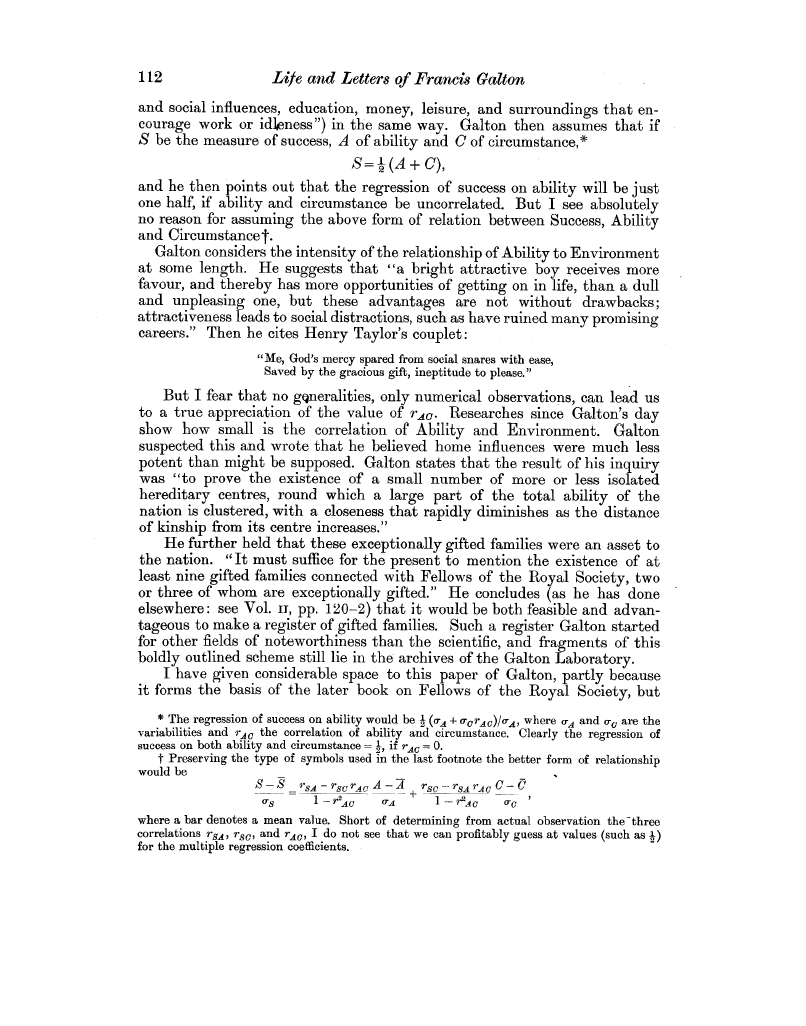| ||||||

OCR Rendition - approximate
112 Life and Letters of Francis Galton and social influences, education, money, leisure, and surroundings that encourage work or idleness") in the same way. Galton then assumes that if S be the measure of success, A of ability and C of circumstance,* S= 2 (A + C), and he then points out that the regression of success on ability will be just one half, if ability and circumstance be uncorrelated. But I see absolutely no reason for assuming the above form of relation between Success, Ability and Circumstance j'. Galton considers the intensity of the relationship of Ability to Environment at some length. He suggests that "a bright attractive boy receives more favour, and thereby has more opportunities of getting on in life, than a dull and unpleasing one, but these advantages are not without drawbacks; attractiveness leads to social distractions, such as have ruined many promising careers." Then he cites Henry Taylor's couplet "Me, God's mercy spared from social snares with ease, Saved by the gracious gift, ineptitude to please." But I fear that no generalities, only numerical observations, can lead us to a true appreciation of the value of r40. Researches since Galton's day show how small is the correlation of Ability and Environment. Galton suspected this and wrote that he believed home influences were much less potent than might be supposed. Galton states that the result of his inquiry was "to prove the existence of a small number of more or less isolated hereditary centres, round which a large part of the total ability of the nation. is clustered, with a closeness that rapidly diminishes as the distance of kinship from its centre increases." He further held that these exceptionally gifted families were an asset to the nation. "It must suffice for the present to mention the existence of at least nine gifted families connected with Fellows of the Royal Society, two or three of whom are exceptionally gifted." He concludes (as he has done elsewhere : see Vol. ii, pp. 120-2) that it would be both feasible and advantageous to make a register of gifted families. Such a register Galton started for other fields of noteworthiness than the scientific, and fragments of this boldly outlined scheme still lie in the archives of the Galton Laboratory. I have given considerable space to this paper of Galton, partly because it forms the basis of the later book on Fellows of the Royal Society, but * The regression of success on ability would be z (o-.A + o crAC)/0A, where 0A and vo are the variabilities and rAC the correlation of ability and circumstance. Clearly the regression of success on both ability and circumstance = 2, if rAC = 0. f Preserving the type of symbols used in the last footnote the better form of relationship would be _ 9'sA - rsC rAC A --A rsC -- rsA rAC C - C Us 1 -r2 AC 0A - + - 1 _ rz 4C °c ' where a bar denotes a mean value. Short of determining from actual observation the-three correlations rsA, rsC, and rAC, I do not see that we can profitably guess at values (such as ) for the multiple regression coefficients.
|